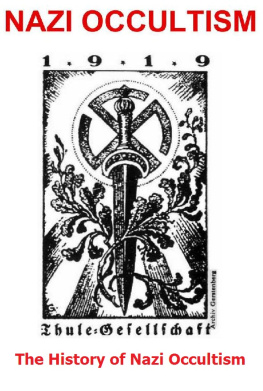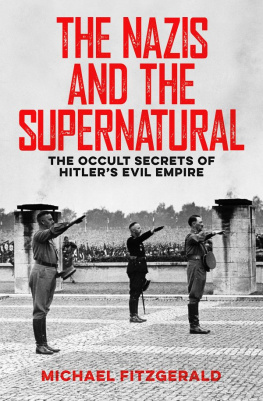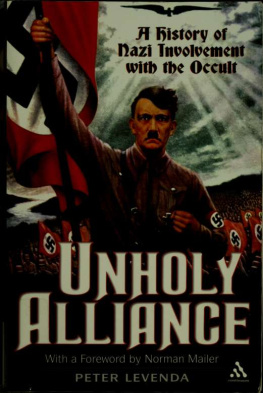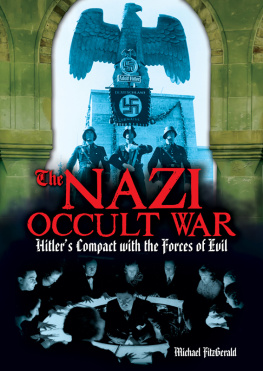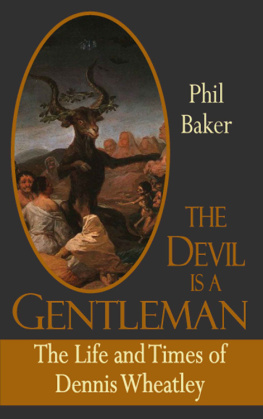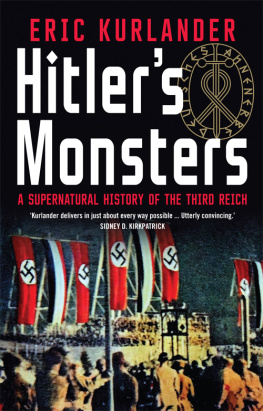Contents
The historian may be rational, but history is not.
Louis Pauwels and Jacques Bergier 'I'm a sceptic.'
'No, you're only incredulous, a doubter, and that's different.'
Umberto Eco, Foucault's Pendulum
Acknowledgements
Grateful acknowledgement is given for permission to quote from the following previously published material:
The Coming Race by E. G. E. Bulwer Lytton, published by Sutton Publishing, Stroud, Gloucestershire, 1995.
Arktos The Polar Myth in Science, Symbolism, and Nazi Survival by Joscelyn Godwin, published by Thames and Hudson, London, 1993.
The Occult Roots of Nazism by Nicholas Goodrick-Clarke, published by I. B. Tauris & Co., London, 1985.
Extract from PROJEKT UFO 1995 W. A. Harbinson. First published by Boxtree Ltd and reprinted with permission from the author.
Trevor Ravenscroft: The Spear of Destiny (York Beach, ME: Samuel Weiser, 1982). Material used by permission.
The Secret Doctrine by Helena Petrovna Blavatsky, published by Theosophical University Press, Pasadena, California, 1999.
Psychic Dictatorship in the USA by Alex Constantine, published by Feral House, 2532 Lincoln Blvd. #359, Venice, CA 90291.
The Making of Adolf Hitler The Birth and Rise of Nazism by Eugene Davidson, published by University of Missouri Press, 1997.
Casebook on Alternative 3 by Jim Keith, published by IllumiNet Press, Lilburn, Georgia, 1994.
Shambhala by Nicholas Roerich, published by the Nicholas Roerich Museum, New York, 1978.
The Last Days of Hitler by Hugh Trevor-Roper, published by Macmillan, London, 1995.
Explaining Hitler The Search For the Origins of His Evil by Ron Rosenbaum, published by Papermac, London, 1999.
The Face of the Third Reich by Joachim C. Fest, first published by Weidenfeld and Nicolson, 1970.
Hitler and the Occult by Ken Anderson, published by Prometheus Books, Amherst, New York, 1995.
Introduction: search for a map of hell
This book is concerned with one of the most controversial notions of the late twentieth century, one that is so bizarre and appalling in its implications that serious historians have consistently dismissed it as the worst kind of nonsense. Put simply, the notion is this: that the shocking nightmare of Nazism and the destruction it wrought throughout the world were the result of an attempt by Hitler and his cohorts to contact and enlist the aid of supernatural forces in their bid for domination of the planet. Upon reading this, older readers may be put in mind of the lurid but enjoyable occult thrillers of Dennis Wheatley, such as Strange Conflict, which deals with Nazi magical practices in a highly sensational way, and may dismiss the idea for that reason. Other readers may well pause to consider the hideous excesses practised by the Nazis and be dismayed that the defining tragedy of the twentieth century should be trivialised by such an idea.
There is no doubt that the subject of the Third Reich inspires a deep and abiding fascination to this day, with the origin of the awful cruelties perpetrated in its name still the subject of intense debate. Ever since Hitler's death in the Fuhrerbunker in 1945, historians, psychologists and theologians have attempted to understand and explain the frightful aberration that was Nazism. One of the foci around which discussion of Hitler moves is the question of where he stands in the spectrum of human nature. As the journalist Ron Rosenbaum notes, the very existence of this spectrum suggests an extremely uncomfortable question: 'is Hitler on a continuum with previous and successive mass murderers, explicable within the same framework, on the extreme end of the same spectrum of the human nature we supposedly share with Jeffrey Dahmer and Mahatma Gandhi? " Or is he something else entirely, existing outside the continuum of humanity, evil in some absolute, ultimate way? The theologian Emil Fackenheim believes that such was the magnitude of Hitler's crimes that we must consider him as representing a 'radical evil', an 'eruption of demonism into history'. (2) Hitler's evil is seen by thinkers like Fackenheim as existing beyond the bounds of ordinary human behaviour (however appalling). Indeed, to them it is so extreme that it transcends the field of behavioural science and enters the realm of theology: in other words, Hitler's ultimate nature can only be completely understood by God.
The industrialised mass murder perpetrated by the Nazis resonated irresistibly through the latter half of the twentieth century, and is certainly the principal contributing factor to what the British historian Norman Davies calls 'a demonological fascination with Germany'. In summarising the historiography of the Western Powers, Davies states: 'Germany stands condemned as the prime source both of the malignant imperialism which produced the First World War, and of the virulent brand of fascism which provoked the Second. ' (3) In the post-war years, this contributed to the 'Allied scheme of history' in which the West presented (and still presents) itself as the pinnacle of civilisation, morality and altruism. While the numerous reasons why this is far from the truth lie beyond the scope of this book, the attitudes that have accompanied the Allied scheme are of extreme importance with regard to our continuing fascination with the Nazis. Davies writes of 'The ideology of "anti-fascism", in which the Second World War of 1939-45 is perceived as "the War against Fascism" and as the defining event in the triumph of Good over Evil. ' (4) It is easy to understand, therefore, how such defining events (particularly those separated from us by a mere 55 years) can tenaciously maintain themselves in the public consciousness.
While historians have tended to concentrate on the many important economic, social and historical factors that influenced Nazi ideology, somewhat less attention has been paid to the Nazis' fascination with arcane and esoteric belief systems, in spite of their undeniable influence upon Hitler and the architects of National Socialism in the years leading up to and including the Second World War. The purpose of this book, therefore, is to attempt to make some sense of the irrational and benighted realms of Nazi occultism and pseudoscience, and to attempt an explanation of the strange attraction they held for their proponents.
Given the human capacity for myth-making, it is perhaps unsurprising that the known history of the Third Reich should have given rise, in subsequent decades, to the assertion that the Nazis were, quite literally, in contact with an evil, transhuman intelligence that chose to exert its influence over humanity through the living conduits of Hitler and other high-ranking members of the Reich. In the course of this book, we shall see that the intellectual fathers of National Socialism, aggressively anti-Semitic Pan-German and volkisch nationalists like Guido von List, Jorg Lanz von Liebenfels and Rudolf von Sebottendorff, cultivated an undeniable and profound interest in occultism, theosophy, the idea of Atlantis as a lost Aryan civilisation, and the magical powers inherent in the very blood of racially pure Germans. That Hitler's immediate subordinates themselves dabbled in occult sciences such as astrology is also beyond doubt. Occultism played a significant role in the formation and rituals of the SS; and it is also a matter of historical record that the Nazis embraced cock-eyed cosmological theories such as Horbiger's World Ice concept (which provided them with an opportunity to denounce the ideas of the Jewish Albert Einstein).
In the decades since the end of the war, some historians have seen Nazi occultism as evidence of the essential irrationality underlying the Third Reich, and as a salutary lesson regarding the power that myth can exercise over the human mind. This point of view is, of course, based on the fact that occultism (however important it may be in the history of the human quest for understanding) is not an accurate way of describing the nature of the Universe. The concepts, beliefs, attitudes and actions we shall encounter in this book, however, are based on the opposite notion, that occultism is a genuine and useful system with which to apprehend and influence the workings of Nature.

